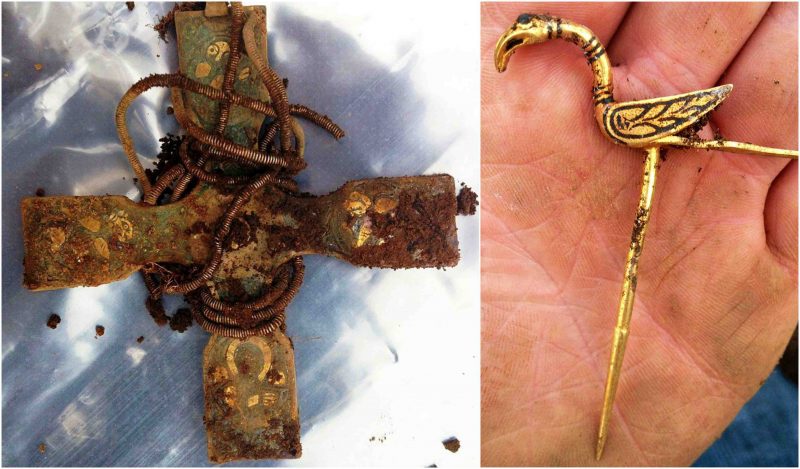The largest hoard of Viking treasure ever found in Britain has now been revealed to the world. In total, there are about 100 intricate pieces, dating to about the 9th and 10th centuries. These rare artifacts were found in Dumfries and Galloway, Scotland, by Derek McLennan, a metal detectorist.
When McLennan, 47, found the hoard in September 2014, he called his wife with the news of the discovery and was so emotional that she thought he had been in a car accident. He had been painstakingly searching an unidentified area of Church of Scotland land in Dumfries and Galloway for more than a year. McLennan is no stranger to finding treasure. He had been part of a group that discovered more than 300 medieval silver coins shortly before Christmas in 2013.
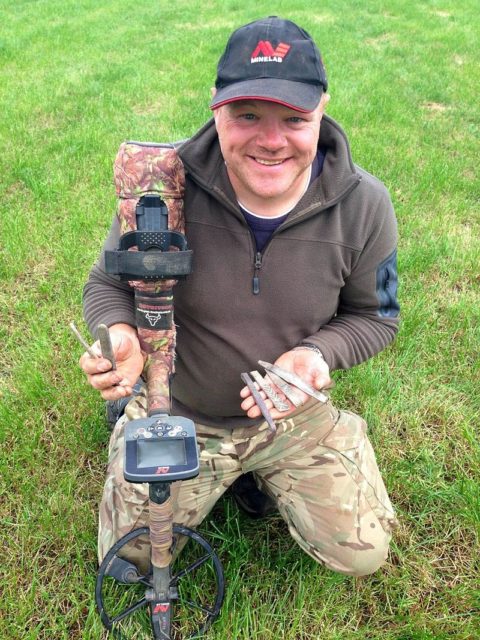
Reverend Doctor David Bartholomew, a Church of Scotland minister of a rural Galloway charge, and Mike Smith, the pastor of an Elim Pentecostal Church in Galloway were with McLennan when he made the find.
“We were searching elsewhere when Derek [McLennan] initially thought he’d discovered a Viking gaming piece.” Rev. Dr. Bartholomew recalled of that moment. “A short time later, he ran over to us waving a silver arm-ring and shouting, ‘Viking!’.”
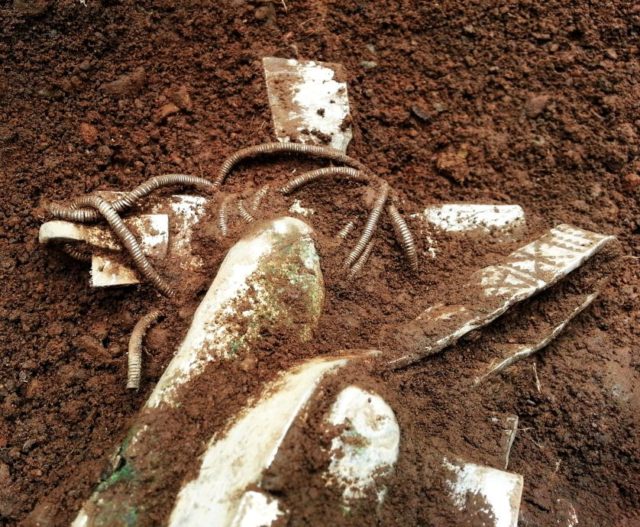
Now, two years after their discovery and 1,000 years after their burial, the artifacts have been revealed. A silver brooch from Ireland, silk from modern-day Turkey, gold and silver ingots, a bird-shaped pin, crystal, and silver arm-rings are just a few of the items found. Interestingly, the oval shape of the arm-rings suggest that they were actually worn before they were buried.
Many of these precious pieces were stashed inside a silver Viking pot, dating from the Carolingian dynasty. At the time of its burial, it was likely already 100 years old and a precious heirloom. It is possibly the largest pot from the Carolingian dynasty found so far.
At the time of the discovery, McLennan noted, “We…don’t know what exactly what is in the pot, but I hope it could reveal who these artifacts belonged to, or at least where they came from.”
The treasure-trove was buried two feet deep in soil and was separated into two levels. Although all the artifacts found are rare and precious, it was the second, lower level that held the particularly fascinating items. It was the second level where the Carolingian dynasty pot was located.
The excavation was undertaken by Andrew Nicholson, the county archaeologist, and Richard Welander, from Historic Environment Scotland. According to Welander, “Before removing the objects we took the rather unusual measure of having the pot CT-scanned, in order that we could get a rough idea of what was in there and best plan the delicate extraction process. That exercise offered us a tantalizing glimpse but didn’t prepare me for what was to come…These stunning objects provide us with an unparalleled insight to what was going on in the minds of the Vikings in Galloway all those years ago.”
He continued, “They tell us about the sensibilities of the time, reveal displays of regal rivalries and some of the objects even betray an underlying sense of humor, which the Vikings aren’t always renowned for.”
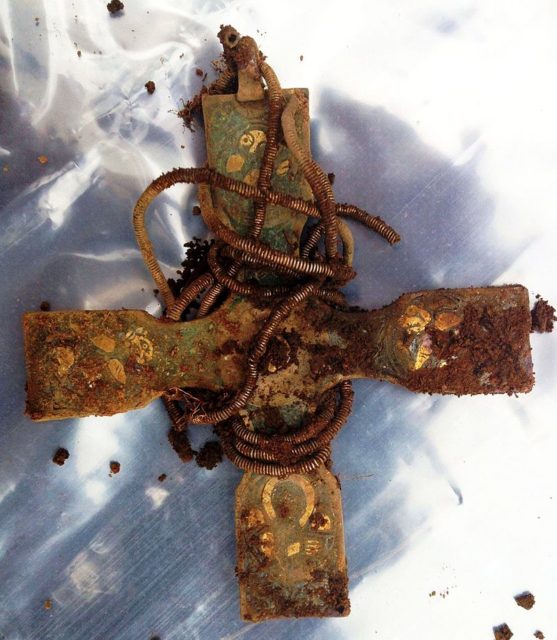
All the discoverers have been left reeling with their find. Rev. Dr. Bartholomew said, “It was tremendously exciting, especially when we noticed the silver cross lying face-downwards.
It was poking out from under the pile of silver ingots and decorated arm-rings, with a finely wound silver chain still attached to it. Here, an archaeologist prepares the cross, which was found among the top level of the hoard, for removal. It was a heart-stopping moment when the local archaeologist turned it over to reveal rich decoration on the other side.”
Their excitement is well deserved. Scotland’s Culture Secretary Fiona Hyslop said of the hoard, “The Vikings were well known for having raided these shores in the past, but today we can appreciate what they have left behind, with this wonderful addition to Scotland’s cultural heritage.
It’s clear that these artifacts are of great value in themselves, but their greatest value will be in what they can contribute to our understanding of life in early medieval Scotland, and what they tell us about the interaction between the different peoples in these islands at that time.”
An early medieval cross, made of gold, was among the largest artifacts found. Due to its size, it was not located in the Carolingian pot. The cross is engraved with decorations that experts say are highly unusual.
McLennan believes that the engravings may represent the four Gospels of Matthew, Mark, Luke, and John. Richard Weland believes that the carvings “resemble the carvings you can see on the remnants of St Cuthbert’s coffin in Durham Cathedral. For me, the cross opens up the possibility of an intriguing connection with Lindisfarne and Iona.”
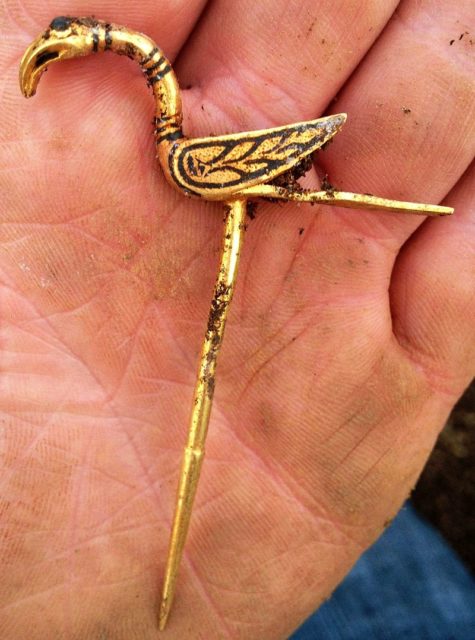
The Treasure Trove Unit, which is responsible for assessing the value of the find on behalf of the Office of Queen’s and Lord Treasurer’s Remembrancer, are now in possession of the Viking hoard.
The experts of the unit validated the claim that the find has significant international importance. After being fully examined, the hoard will be offered for allocation to Scottish museums. McLennan is eligible for a reward equal to the market value of the find — a cost that will be met by the successful museum.
Concerning money, an agreement between the landowners — the Church of Scotland General Trustees — and the finder, McLennan has been reached. David Robertson, Secretary to the General Trustees, said, “Any money arising from this will first and foremost be used for the good of the local parish.
We recognize Derek is very responsible in pursuing his interest, but we do not encourage metal detecting on Church land unless detailed arrangements have been agreed beforehand with the General Trustees.”
